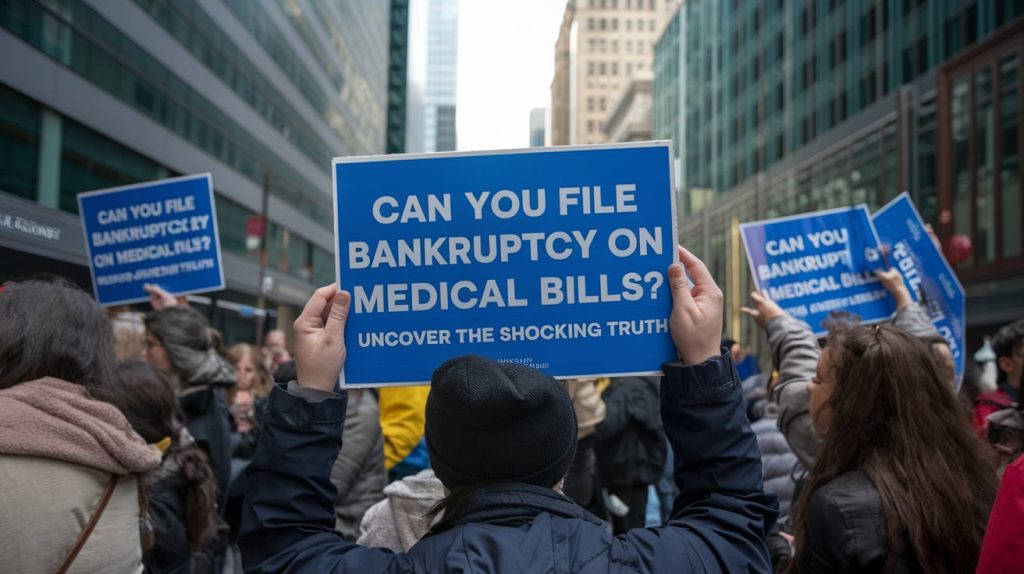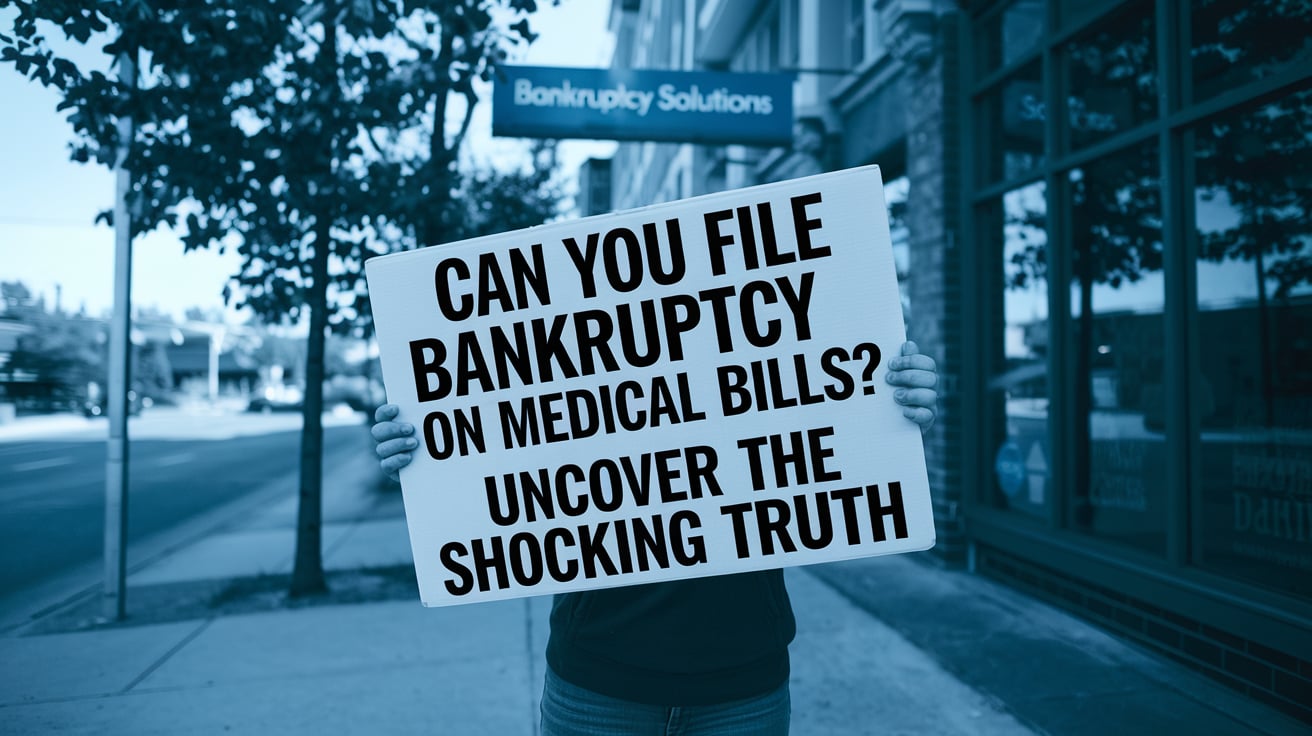Table of Contents
Can you file bankruptcy on medical bills? If you’re struggling with overwhelming medical debt, you’re not alone. Medical expenses can quickly spiral out of control, leaving many wondering if bankruptcy is the only option. This article will uncover whether filing for bankruptcy can relieve medical bills and what you need to know before making this critical decision.
Can You File Bankruptcy on Medical Bills? Understanding Medical Debt

Medical Bills: A Growing Problem
Can You File Bankruptcy on Medical Bills? Medical bills are one of the leading causes of financial distress in the United States. Even with health insurance, unexpected medical emergencies can lead to significant debt. According to recent studies, millions of Americans face financial hardship due to medical expenses, making it a common concern for many households.
The Impact of Medical Debt on Finances
The burden of medical debt can affect every aspect of your financial life. It can damage your credit score, lead to collection calls, and even legal action. Understanding the implications of medical debt is the first step in deciding whether filing for bankruptcy is the right choice.
Can You File Bankruptcy on Medical Bills?
Yes, You Can File Bankruptcy on Medical Bills
The simple answer is yes, you can file bankruptcy on medical bills. Medical debt is considered unsecured, similar to credit cards or personal loans. Both Chapter 7 and Chapter 13 bankruptcy allow you to discharge or reorganize medical debt, providing a potential path to financial recovery.
Chapter 7 vs. Chapter 13 Bankruptcy
Can You File Bankruptcy on Medical Bills? When considering bankruptcy, it’s essential to understand the difference between Chapter 7 and Chapter 13:
- Chapter 7 Bankruptcy: Also known as liquidation bankruptcy, Chapter 7 allows you to eliminate most unsecured debts, including medical bills, without the need to repay them. This option is usually for those with limited income and assets.
- Chapter 13 Bankruptcy: This form of bankruptcy involves creating a repayment plan to pay off your debts over three to five years. While it doesn’t eliminate medical debt immediately, it allows you to pay it off more manageably.
The Process of Filing Bankruptcy on Medical Bills
Step-by-Step Guide to Filing Bankruptcy
Can You File Bankruptcy on Medical Bills? Filing bankruptcy on medical bills involves several steps:
- Consult a bankruptcy attorney. It is imperative to have legal counsel before filing. You can be guided and assisted by an attorney in understanding your alternatives.
- Gather Financial Information: You must provide detailed information about your income, expenses, assets, and debts. This information will determine whether you qualify for Chapter 7 or Chapter 13 bankruptcy.
- Complete Required Forms: Filing for bankruptcy requires filling out specific forms, including a petition and schedules of assets and liabilities.
- Attend Credit Counseling: You must finish a credit counseling course from an authorized provider before filing.
- File Your Petition: Once you’ve completed all the necessary steps, your attorney will file your petition with the bankruptcy court.
- Meet with Creditors: You may be required to attend a meeting with your creditors, known as a 341 meeting, where you’ll answer questions about your finances.
- Discharge of Debts: If the court approves your bankruptcy, your medical debts will be discharged (Chapter 7) or reorganized into a repayment plan (Chapter 13).
What Happens After Filing?
After filing for bankruptcy on medical bills, the court will issue an automatic stay, which stops most collection actions against you. This means creditors can no longer contact you, garnish your wages, or take legal action to collect the debt.
Can You File Bankruptcy on Medical Bills? Alternatives to Bankruptcy for Medical Debt
Negotiating Medical Bills
Before deciding on bankruptcy, consider negotiating your medical bills with healthcare providers or collection agencies. Many hospitals and doctors are willing to set up payment plans or reduce the amount you owe if you demonstrate financial hardship.
Debt Consolidation
Debt consolidation is another option to manage medical debt. By combining multiple debts into a single loan, you may be able to lower your monthly payments and make it easier to manage your finances.
Seeking Financial Assistance
Various charities, nonprofit organizations, and government programs offer financial assistance for those struggling with medical bills; research available options in your area to see if you qualify for help.
Also Read: Can You Die from Hypnic Jerk? Uncovering the Startling Truth
The Pros and Cons of Filing Bankruptcy on Medical Bills
Pros
- Immediate Relief from Debt: Filing for bankruptcy can provide immediate relief from overwhelming medical debt, allowing you to regain control of your finances.
- Protection from Creditors: The automatic stay prevents creditors from taking further action against you, giving you peace of mind.
- Fresh Financial Start: Bankruptcy can give you a fresh start, free from the burden of medical debt, enabling you to rebuild your financial life.
Cons
- Impact on Credit Score: Filing for bankruptcy will negatively impact your credit score, making it more challenging to obtain credit in the future.
- Potential Loss of Assets: In Chapter 7 bankruptcy, you may be required to sell some of your assets to repay creditors.
- Stigma and Emotional Impact: Bankruptcy can carry a social stigma and may cause emotional stress.
Can you file bankruptcy on medical bills? Yes, but it’s a decision that should not be taken lightly. While bankruptcy can provide much-needed relief from overwhelming medical debt, it has significant consequences. Weigh the pros and cons carefully and consult a financial advisor or bankruptcy attorney to determine the best action for your situation.
Filing for bankruptcy is not the end of your financial journey; it can begin a new chapter. By understanding your options and making informed decisions, you can take control of your finances and move towards a debt-free future.

